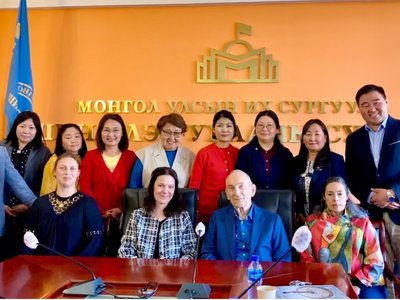

The KoEF project “Terminology Planning Strategy and Terminology Infrastructure for Mongolia to Support Scientific and Educational Development and Innovation” aims to enhance Mongolia’s sustainable development by establishing a comprehensive strategy for terminology planning and infrastructure.
Mongolia, with an area of 1,564,116 km² and a population of 3.5 million, is the world’s 18th-largest country and one of its most sparsely populated. Over half of its population lives in Ulaanbaatar, the nation’s educational and administrative center. The economy relies heavily on mining, which accounts for 80% of exports, and agriculture, particularly livestock herding. Significant improvements in human capital have been made over the past three decades. Geographically, Mongolia is marked by extremes—rugged mountains, vast steppes, and deserts—and experiences a climate with scorching summers and harsh winters. These natural conditions, along with environmental challenges from both natural and human-induced factors, shape the country's unique socio- economic landscape. Despite political and historical upheavals, Mongolia continues to preserve its cultural heritage and traditional lifestyle, with digital content, both historical and modern, playing a critical role in sustaining this legacy.
Terminological information is crucial for managing digital content, particularly in education, research, governance, and industry. The international standard ISO 29383:2020 “Terminology policies — Development and implementation” defines terminology planning as the development, improvement, implementation, and dissemination of terminology across various fields. This scope goes beyond specialized language to encompass structured content in the humanities, social sciences, and digital heritage, addressing multilingual needs and the demands of a knowledge society.
In collaboration with the Mongolian Academy of Sciences, the University of Vienna, and the Austrian Academy of Sciences, the project provided expertise to develop terminology approaches, methods, and policies tailored to Mongolia’s needs. Key achievements of the project include:
- Capacity building: Mongolian experts were trained in terminology science and management, enabling them to continue these efforts independently, including training local stakeholders.
- Roadmap development: A strategic roadmap was created to guide the development and implementation of terminology planning and infrastructure in Mongolia.
- Status analysis: Studies documented the current state of Mongolia’s terminology science and infrastructure, examining the legislative framework, standards, and related factors.
- Stakeholder mapping: Key stakeholders were identified and their needs analyzed, ensuring alignment with national and international terminology policies.
- Establishment of a virtual terminology center: The Terminology.mn platform was launched in 2023, providing a centralized resource for terminology materials, updates, and news.
- International conferences: Two international conferences facilitated dialogue among local and global experts on terminology and terminology planning, promoting knowledge exchange and cooperation.
- Awareness and dissemination: Workshops, seminars, and roundtables raised awareness and built capacity in terminology science, encouraging engagement with stakeholders.
- Sustainable cooperation: The establishment of the Mongolian Terminology Cooperation Group ensured long-term collaboration and coordinated efforts across institutions.
These initiatives have significantly enhanced Mongolia’s expertise in terminology science, advancing its academic, cultural, and technological progress and contributing to the achievement of the UN Sustainable Development Goals.
